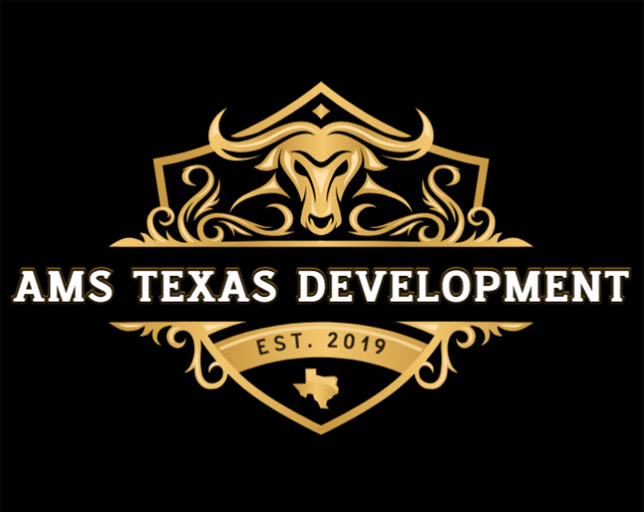Invest in Real Estate, Secure Your Future
As an investor, you recognize the value of diversifying your portfolio with investments that not only promise financial growth but also align with your long-term goals. Investing in single-family residential real estate offers a distinct advantage by providing stable returns and tangible benefits. Single-family homes, as a cornerstone of real estate investments, offer consistent rental income, property appreciation, and lower management costs compared to commerical properties.
Interested in learning more?
Would you like to explore further? Connect with one of our partners to discuss the advantages of residential single-family investments and how they can enhance your portfolio. We will provide a calendar link for you to schedule a time that suits your convenience.
Note from our General Partners
At AMS Texas Development, we believe in building genuine relationships and partnerships, rather than relying on traditional sales tactics like funnels or “free-e-book” giveaways. Our approach is straightforward and personal. We simply ask for your email and phone number to explore a potential fit for our real estate placement possibilities.
We value your time and want to ensure that our conversation is mutually beneficial. Please feel free to book a call at your convenience using my calendar link below. During this brief discussion, we’ll determine if there’s a good alignment between our goals and yours. If it makes sense, We will Personally invite you to work with us. Thank you for considering AMS Texas Development. We look forward to the possibility of working together and achieving great success.

Key Benefits
Stable and Preditable Returns
Residential real estate is widely regarded as a stable and predictable investment for several compelling reasons:
Consistent Demand
The need for housing remains constant regardless of economic fluctuations. Single-family homes are always in demand due to the fundamental necessity of shelter. This steady demand helps ensure a reliable rental income and lower vacancy rates.
Predictable Cash Flow
Rental income from residential properties provides a predictable cash flow. Unlike other investment vehicles that may experience volatile returns, residential rental income is generally stable and can be forecasted based on current lease agreements and market conditions.
Long-Term Appreciation
Historically, residential real estate has shown steady appreciation over time. While short-term fluctuations can occur, property values tend to increase gradually, driven by factors like population growth, urban development, and inflation. This long-term appreciation contributes to the overall stability of the investment.
Lower Market Volatility
Residential real estate typically experiences lower volatility compared to stocks or commercial real estate. Market conditions such as interest rates and housing supply affect residential properties, but these factors generally influence the market more slowly and predictably.
Inflation Hedge
Real estate is often considered a good hedge against inflation. As the cost of living rises, so too does rental income and property values, providing a safeguard against the eroding purchasing power of money.
Diversification
Residential real estate offers diversification benefits to an investment portfolio. It is a tangible asset that is less correlated with the performance of financial markets, thus providing a cushion against market downturns and contributing to overall portfolio stability.
Control and Management
Investors have a degree of control over their residential properties, allowing them to influence rental rates, manage property expenses, and maintain the property to sustain its value. This hands-on approach can enhance stability and predictability compared to more passive investment forms.
Overall, the combination of consistent demand, predictable cash flow, long-term appreciation, and lower volatility makes residential real estate a reliable and stable investment choice for those seeking both security and growth.
Positive Community Impact
Investing in economically challenged neighborhoods can have profound and positive effects on the area, creating a ripple of benefits that extend beyond financial gains. Here are several reasons why such investments are advantageous for the community.
Economic Revitalization
Investment in economically challenged neighborhoods can spur local economic growth. By improving properties and increasing property values, investors help to attract new businesses and services, creating job opportunities and fostering a more vibrant local economy.
Enhanced Property Values
Investing in and renovating properties can lead to increased property values, which can elevate the overall quality of the neighborhood. As property values rise, homeowners and renters alike benefit from improved living conditions and enhanced neighborhood appeal.
Community Improvement
Investment often leads to infrastructure improvements, such as better-maintained roads, parks, and public spaces. These upgrades contribute to a higher quality of life for residents and make the area more attractive to potential new residents and businesses.
Increased Safety
As investment leads to revitalization, areas often experience reductions in crime rates. Improved lighting, well-maintained properties, and active community engagement can deter criminal activity and create a safer environment for residents.
Social Benefits
Investing in economically challenged neighborhoods can also foster stronger, more connected communities. Development projects can include community spaces and programs that bring residents together, enhance local pride, and support social cohesion.
Affordable Housing
Investments in these areas often include the development or renovation of affordable housing. This ensures that low- and moderate-income families have access to quality housing options, helping to address issues of housing insecurity and displacement.
Catalyst for Further Investment
Initial investments can act as a catalyst for additional development. When investors see positive changes in an area, it can encourage more investment and development, leading to a cycle of growth and improvement.
Environmental Benefits
Renovating existing structures and revitalizing neglected areas can lead to environmental benefits, such as reducing urban sprawl and conserving green spaces. Sustainable development practices can also be incorporated, improving the neighborhood’s environmental footprint.
Education and Community Services
As neighborhoods improve, there is often increased interest in local schools and community services. Enhanced community infrastructure can lead to better educational facilities and services, benefiting families and children in the area.
Economic Stability
By fostering economic development and improving living conditions, investments can contribute to the long-term economic stability of the neighborhood. This creates a more resilient community capable of weathering economic challenges and attracting future opportunities.
Investing in economically challenged neighborhoods not only offers potential financial returns but also plays a crucial role in revitalizing and improving communities. These investments contribute to a positive cycle of growth, stability, and enhanced quality of life for residents.
Diversification and Risk Mitigation
Investing in a portfolio of high-quality, income-producing residential properties in one of the fastest-growing markets in Texas, such as Dallas/Fort Worth, offers several strategic advantages that can significantly mitigate risk and enhance your overall portfolio performance. Here’s a deeper look into why this approach is beneficial:
Robust Market Growth
Dallas/Fort Worth is renowned for its dynamic economic growth and expanding population. The region's robust job market, diverse economy, and population influx contribute to a high demand for housing. By investing in this thriving market, you align yourself with a region poised for continued growth, which supports higher property values and rental income potential.
Diversification Benefits
A portfolio of high-quality, income-producing properties across this expansive metro area allows for geographic and property type diversification. This reduces the risk associated with any single investment and balances potential fluctuations in market performance, leading to a more stable and resilient investment strategy.
Stable Rental Income
High-quality residential properties in prime locations within a growing market are likely to attract reliable tenants. The strong demand for rental properties in Dallas/Fort Worth ensures consistent occupancy rates and stable rental income, which enhances the predictability of cash flow and minimizes income volatility.
Appreciation Potential
The Dallas/Fort Worth area has experienced substantial property appreciation due to its economic vitality and infrastructure development. Investing in this market positions your portfolio to benefit from rising property values, which can lead to significant capital gains over time.
Economic Resilience
Dallas/Fort Worth boasts a diversified economy with sectors such as technology, finance, healthcare, and education driving growth. This economic resilience reduces the likelihood of severe market downturns, contributing to a more stable investment environment for residential properties.
Population Growth
The region’s steady population growth drives ongoing demand for housing. As new residents move to the area, the demand for quality rental properties increases, ensuring that your investments remain desirable and competitive.
Strategic Property Selection
By focusing on high-quality properties, you benefit from better construction standards, desirable amenities, and appealing locations. Such properties attract high-caliber tenants, reduce maintenance costs, and often command higher rents, enhancing overall investment returns.
Long-Term Investment Stability
Residential real estate, particularly in high-growth areas, tends to offer long-term stability. With careful selection and management, properties in Dallas/Fort Worth can provide consistent returns and contribute positively to your portfolio’s long-term performance.
Tax Advantages
Real estate investments come with various tax benefits, including depreciation and mortgage interest deductions. By investing in a diverse portfolio of properties, you can maximize these benefits and improve your overall tax efficiency.
Local Expertise and Resources
Investing in a well-established market like Dallas/Fort Worth provides access to a network of local real estate professionals, property managers, and service providers. This local expertise can aid in property acquisition, management, and maintenance, ensuring that your investments are well-managed and optimized for performance.
In summary, investing in a portfolio of high-quality, income-producing residential properties within the rapidly growing Dallas/Fort Worth market enables you to capitalize on the region’s economic strength and population growth. This strategy not only diversifies your investment risk but also enhances your overall portfolio performance through stable rental income, appreciation potential, and economic resilience.
Experienced Leadership
Guided by a team of like-minded real estate professionals, each an expert in their field with over 100 years of combined experience, AMS Texas Development has successfully managed a multitude of property investments, demonstrating a proven track record and deep industry knowledge. Reach out to us today to explore if our offerings align with your investment goals.
Tax Advantages
Investing in single-family real estate offers several compelling tax advantages that can significantly enhance an investor’s financial returns. Here’s an expanded look at these potential benefits.
Depreciation Deductions
One of the most significant tax benefits of investing in single-family real estate is the ability to depreciate the property. Depreciation allows investors to deduct a portion of the property’s cost over time, typically 27.5 years for residential properties, from their taxable income. This non-cash deduction can significantly reduce taxable income and lower overall tax liability.
Mortgage Interest Deduction
Investors can deduct the interest paid on the mortgage for their rental properties. This deduction applies to both primary and secondary mortgages and can lead to substantial tax savings, especially during the early years of the mortgage when interest payments are higher.
Property Tax Deductions
Property taxes paid on single-family rental properties are deductible. This deduction helps reduce the investor’s taxable income, providing further tax relief and improving cash flow.
Operating Expenses
Investors can deduct various operating expenses associated with managing and maintaining their rental properties. These expenses include property management fees, repairs and maintenance costs, utilities, insurance, and supplies. Deducting these costs helps offset rental income and reduce taxable income.
Home Office Deduction
If an investor manages their real estate investments from a home office, they may qualify for a home office deduction. This allows them to deduct a portion of their home-related expenses, such as utilities and mortgage interest, proportional to the space used for business purposes.
Capital Gains Exclusion (1031 Exchange)
When selling an investment property, investors can defer capital gains taxes by utilizing a 1031 exchange. This strategy involves reinvesting the proceeds from the sale into a like-kind property, allowing investors to defer paying taxes on the capital gains until the replacement property is sold.
Travel Expenses
Costs related to traveling for property management, including trips to visit properties or meet with contractors, can be deductible. This deduction covers expenses such as mileage, airfare, lodging, and meals related to property management activities.
Professional Services
Fees paid to professionals, such as accountants, attorneys, and property management services, are deductible. These costs are considered part of the operational expenses necessary for managing and maintaining rental properties.
Tax Benefits of Rental Income
While rental income is taxable, the ability to offset this income with various deductions reduces the effective tax rate on the rental income. This makes the income generated from single-family rental properties more tax-efficient.
Improvements and Capital Expenses
Although not immediately deductible, capital improvements to the property can be depreciated over time. These improvements, such as major renovations or additions, add value to the property and can provide long-term tax benefits through depreciation.
By leveraging these tax advantages, investors in single-family real estate can enhance their overall returns and improve cash flow. The combination of depreciation, deductible expenses, and various tax strategies helps to optimize the financial benefits of owning and managing residential rental properties.

Delivering passive income through real estate investments
- 817-300-3738
- [email protected]
- Fort Worth Texas and Surrounding Areas
- 817-300-3738
- [email protected]
- 9348 Harbour View Lane, Fort Worth Texas 76179
**Disclaimer:** No Offer of Securities. Under no circumstances should any material on this site be used or considered as an offer to sell or a solicitation of any offer to sell securities. The information here is not comprehensive and is subject to other offering materials. It is not investment, financial, or legal advice. Visitors should seek their own counsel before investing. Projections are not guaranteed, and actual results may vary, including potential loss of capital. For more details, contact the Sponsor directly: [email protected].
